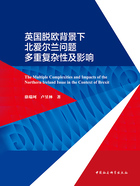
第三节 本书的篇章结构
本书第一部分共四章,致力于探讨北爱尔兰边界问题的多重复杂性。北爱尔兰边界问题之所以在英国脱欧进程中成为敏感且棘手的难题,主要是因为该问题具有多重复杂性,它不仅是一个历史遗留问题,而且是一个影响着错综复杂的利益关系的现实问题。
第一,北爱尔兰边界问题涉及北爱尔兰历史的复杂性。北爱尔兰地区族群冲突并未随着1922年爱尔兰岛南北分治而平息,反而愈演愈烈。联合主义者与民族主义者之间的群体性冲突于1968年达到高峰,此后,北爱尔兰地区经历了硝烟四起、民不聊生的30年,这30年被称为“动乱”(The Troubles)的30年。在这30年里,大约有3500名北爱尔兰人死于暴力冲突之中,平均每1000个北爱尔兰人中,有2.5人丧生。[48]可见,在1998年4月《贝尔法斯特协议》签订之前,北爱尔兰历史夹杂着太多的暴力冲突和流血记忆,伤痕累累。英国脱欧再次撕裂了原本尚未愈合的伤口,使得充满伤疤和愤懑的历史阴云再次笼罩北爱尔兰地区。正所谓旧伤未愈,再添新伤,历史与现实的交织使得北爱尔兰地区再次陷入迷茫之中。
第二,北爱尔兰边界问题涉及经济影响的复杂性。英国脱欧使得北爱尔兰与爱尔兰、英国其他地区、欧洲大陆的欧盟成员国的经贸关系面临更多的不确定性,尤其是对爱尔兰岛南北经济一体化以及北爱尔兰与英国其他地区的经贸关系造成了难以估量的负面影响。
第三,北爱尔兰边界问题涉及政治和外交影响的复杂性。北爱尔兰边界问题关乎英国主权和宪政完整性,激化了北爱尔兰地方政党政治矛盾,亦使得爱尔兰与北爱尔兰的政治关系更加复杂,政治和解和政治合作进程受阻。北爱尔兰边界问题不但给原本和谐的英国—爱尔兰外交关系增添了新的挑战,也增加了英国—欧盟未来关系、英美特殊关系的不稳定因素。
第四,北爱尔兰边界问题具有安全影响的复杂性。北爱尔兰边界问题打乱了《贝尔法斯特协议》签订后的北爱尔兰和平进程,一方面使得原本逐渐沉寂的族群间暴力冲突再次浮出水面,制造了北爱尔兰地区安全的不稳定因素;另一方面使得两大对立族群原本在欧盟框架下共享的身份和心理安全感大幅削弱,北爱尔兰社会再次被置于巨大的撕裂风险之中。
本书第二部分和第三部分共六章,致力于分析在英国脱欧谈判期间,利益攸关方围绕北爱尔兰边界问题的政治博弈。正是由于主要利益攸关方在北爱尔兰边界问题上的难以调和的矛盾和分歧,才使得脱欧谈判一拖再拖。本部分试图通过过程追踪法,全方位展现利益攸关方围绕北爱尔兰边界问题的政治博弈。英国保守党政府和欧盟是英国脱欧谈判的两大主要参与者,但双方的谈判立场均受到其他利益攸关方的影响。英国保守党政府的脱欧路线受到保守党内部硬脱欧派和软脱欧派、民主统一党和以工党为代表的反对党等利益攸关方的掣肘,制定脱欧政策的自由度较为有限。对于欧盟而言,爱尔兰在英国脱欧,尤其是北爱尔兰边界问题上的立场影响着欧盟的脱欧谈判政策。利用欧盟这一重要平台,爱尔兰放大了在英国脱欧谈判进程中的影响力,左右着英国脱欧谈判的走向。英国与欧盟在北爱尔兰边界问题取得突破性进展的关键前提是英国与爱尔兰在北爱尔兰边界问题的解决上达成共识。第二部分和第三部分将英国脱欧谈判分为三个阶段:英国脱欧谈判准备阶段(2016年7月—2017年5月)、特雷莎·梅时期脱欧谈判阶段(2017年6月—2019年6月)和约翰逊时期脱欧谈判阶段(2019年7月—2019年12月)。在各个阶段,主要利益攸关方之间在北爱尔兰边界问题上进行了纷繁复杂的多重博弈。
本书第四部分共三章,致力于研究后脱欧时代北爱尔兰的政治前景、经济前景和统一前景。在2020年1月31日英国正式离开欧盟后,北爱尔兰问题依然棘手。以民主统一党为代表的北爱尔兰联合主义派坚决反对约翰逊政府与欧盟达成的《北爱尔兰议定书》,认为该议定书违背了《贝尔法斯特协议》的原则,不但不利于英国国家统一,而且危及原本脆弱的北爱尔兰和平进程。在北爱尔兰政治前景层面,本部分主要分析了北爱尔兰联合主义派政党和民族主义派政党在《北爱尔兰议定书》的摩擦、英国中央政府与北爱尔兰自治政府在内部市场法案上的矛盾,以及北爱尔兰与爱尔兰南北统一的可能性。在北爱尔兰经济前景层面,本部分主要分析了《北爱尔兰议定书》对北爱尔兰的经济影响及其后脱欧时代英国(尤其是北爱尔兰)与欧盟经贸关系。在北爱尔兰统一前景层面,本部分主要分析了后女王时代北爱尔兰民族分离主义的新态势及其对爱尔兰统一前景的影响。在后女王时代,英国脱欧余波、新芬党崛起以及天主教徒人口优势使得北爱尔兰民族分离主义在短暂沉寂后再度高涨,北爱尔兰脱离英国的可能性增加。尽管如此,北爱尔兰民族分离主义短期内难以成功,其主要面临四重约束性因素:发起爱尔兰统一公投的条件依然不具备;北爱尔兰政治分裂依然严重;北爱尔兰天主教徒民族主义者人口优势依然薄弱;爱尔兰公众对爱尔兰统一依然持犹疑态度。英国政府在处理北爱尔兰事务上的政策失误,值得每一个面临分裂风险的国家高度重视并认真反思。
[1] Adrian Guelke,“Britain After Brexit:The Risk to Northern Ireland,”Journal of Democracy,Vol.28,No.1,2017,pp.42-52.
[2] Katy Hayward and Mary Murphy,“The EU's Influence on the Peace Process and Agreement in Northern Ireland in Light of Brexit,”Ethnopolitics,Vol.17,No.3,2018,pp.276-291.
[3] Jonathan Stevenson,“Does Brexit Threaten Peace in Northern Ireland?”Survival Global Politics and Strategy,Vol.59,No.3,2017,pp.111-128.
[4] Cathy Gormley-Heenan and Arthur Aughey,“Northern Ireland and Brexit:Three Effects on ‘the Border in the Mind’,” The British Journal of Politics and International Relations,Vol.19,No.3,2017,pp.497-511.
[5] John Doyle and Eileen Connolly,“Brexit and the Future of Northern Ireland,”Brexit Institute,Working Paper 1-2017,https://dcubrexitinstitute.eu/wp-content/uploads/2017/06/WP-2017-1-Doyle-Connolly-1.pdf.
[6] Giada Lagana,The European Union and the Northern Ireland Peace Process,2021,Cham:Springer Nature.
[7] Feargal Cochrane,Breaking Peace:Brexit and Northern Ireland,Manchester:Manchester University Press,2020.
[8] 梁跃天:《欧盟与北爱尔兰和平进程——兼论英国“脱欧”对北爱尔兰和平进程的影响》,《国别和区域研究》2020年第2期。
[9] John Doyle and Eileen Connolly,“The Effects of Brexit on the Good Friday Agreement and the Northern Ireland Peace Process,”in Cornelia-Adriana Baciu and John Doyle,eds.,Peace,Security and Defence Cooperation in Post-Brexit Europe,Cham:Springer Nature,2019,pp.79-95.
[10] 王磊、曲兵:《北爱尔兰和平协定的实施及其启示》,《现代国际关系》2018年第12期。
[11] Seán Brennan,“From Warrior Regimes to Illicit Sovereigns:Ulster Loyalist Paramilitaries and the Security Implications for Brexit,” Small Wars & Insurgencies,Vol.32,No.4-5,2021,pp.747-771.
[12] 抗特计算法是在比例代表制下的最高均数方法选举形式之一,其基本规则如下:把每一参选政党所获得的票数除以1、2、3直至议席数目,然后将得出的数字分配给该政党名单上排第一位、第二位的候选人、如此类推,然后比较各政党候选人所获得的数字,高者为胜。参见European Parliament,“Understanding the d'Hondt Method,”June 2019,https://www.europarl.europa.eu/RegData/etudes/BRIE/2019/637966/EPRS_BRI(2019)637966_EN.pdf。
[13] Niall Ó Dochartaigh,“Beyond the Dominant Party System:the Transformation of Party Politics in Northern Ireland,”Irish Political Studies,Vol.36,No.1,2021,pp.7-28.
[14] Lisa Claire Whitten,“LE19-a Turning of the Tide?Report of Local Elections in Northern Ireland,2019,”Irish Political Studies,Vol.35,No.1,2020,pp.61-79.
[15] 曲兵:《北爱尔兰民主统一党对英国脱欧谈判的影响》,《国际政治参考》2019年第2期。
[16] Mary C.Murphy and Jonathan Evershed,“The DUP and the European Union:from Contestation to Conformance and Back Again,”Irish Political Studies,Vol.35,No.3,2020,pp.378-398.
[17] 王新影:《英国脱欧对北爱尔兰族群问题的影响及其前景分析》,《世界民族》2020年第3期。
[18] Megan A.Armstrong,Clare A.G.Rice and Ben Warwick,“The Visual Communication of Brexit in Northern Ireland:Decoding Public Imagery on Identity,Politics and Europe,”2022,https://doi.org/10.1080/21622671.2022.2115544.
[19] Stephanie Dornschneider and Jennifer Todd,“Everyday Sentiment among Unionists and Nationalists in a Northern Irish Town,”Irish Political Studies,Vol.36,No.2,2021,pp.185-213.
[20] Barry O'Connell and Mike Medeiros,“The Brexit Effect?Ethno-National Divisions on the Island of Ireland among Political Elites and the Youth,”Nationalism and Ethnic Politics,Vol.26,No.4,2020,pp.389-404.
[21] 忠诚主义者受宗教思想的影响,将天主教徒视为异己;而亲英派以公民国籍身份为意识形态核心,将排斥英国公民身份的人视为异己。
[22] John Coakley,“Choosing Between Unions?Unionist Opinion and the Challenge of Brexit,”Irish Political Studies,Vol.35,No.3,2020,pp.356-377.
[23] Ahmet Çoymak and Emma O'Dwyer,“Does Brexit Mean a Return to Sectarianism?Beyond‘the Border Issue’,the Future of Social Identities in Northern Ireland from a Political Psychological Perspective,”Development,Vol.63,No.1,2020,pp.74-78.
[24] Thomas M. Wilson,“Fearing Brexit:the Changing Face of Europeanization in the Borderlands of Northern Ireland,” Ethnologia Europaea,Vol.50,No.2,2020,pp.32-48.
[25] Cathy Gormley-Heenan and Arthur Aughey,“Northern Ireland and Brexit:Three Effects on ‘the Border in the Mind’,” The British Journal of Politics and International Relations,Vol.19,No.3,2017,pp.497-511.
[26] 赵志朋:《脱欧后北爱尔兰地区宗派主义与分离主义的耦合趋势研究》,《基督宗教研究》2020年第2期。
[27] Renée Van Abswoude and Lotje de Vries,“How Brexit Affects Boundaries in Northern Ireland,”Peace Review,Vol.32,No.2,2020,pp.125-133.
[28] Adrian Guelke,“Northern Ireland,Brexit,and the Interpretation of Self-Determination,”Nationalism and Ethnic Politics,Vol.35,No.4,2019,pp.383-399.
[29] Mary C. Murphy,“Northern Ireland and Brexit:Where Sovereignty and Stability Collide?” Journal of Contemporary European Studies,Vol.29,No.3,2021,pp.405-418.
[30] Eileen Connolly and John Doyle,“Brexit and the Changing International and Domestic Perspectives of Sovereignty over Northern Ireland,” Irish Studies in International Affairs,Vol.30,No.1,2019,pp.217-233.
[31] Michael Ashcroft,“My Northern Ireland Survey Finds the Union on a Knife-edge,”2019,https://lordashcroftpolls.com/2019/09/my-northern-ireland-survey-finds-the-union-on-a-knife-edge/;Lucid Talk,“LT NI Sunday Times January 2021-NI-Wide Poll,”2021,https://www.lucidtalk.co.uk/single-post/lt-ni-sunday-times-january-2021-state-of-the-uk-union-poll;Peter Shirlow,“The Ireland/Northern Ireland Protocol:Consensus or Conflict?”2021,https://www.liverpool.ac.uk/humanities-and-social-sciences/research/projects/ni-protocol-consensus-or-conflict/.
[32] John Garry et al.,“Public Attitudes to Different Possible Models of a United Ireland:Evidence from a Citizens' Assembly in Northern Ireland,”Irish Political Studies,Vol.35,No.3,2020,pp.422-450;John Garry et al.,“The Future of Northern Ireland:Border Anxieties and Support for Irish Reunification Under Varieties of UK exit,”Regional Studies,Vol.55,No.9,2021,pp.1517-1527.
[33] Alan Renwick et al.,“Public Attitudes to Referendums on Irish Unification in Northern Ireland:Evidence from an Online Consultation,”2022,https://doi.org/10.1080/07907184.2022.2152797.
[34] Niall Ó Dochartaigh,“Beyond the Dominant Party System:the Transformation of Party Politics in Northern Ireland,”Irish Political Studies,Vol.36,No.1,2021,pp.7-28.
[35] Albert Hirshman,“Exit,Voice,and the Fate of the German Democratic Republic:An Essay in Conceptual History,”World Politics,Vol.45,No.2,1993,pp.173-202;Albert Hirshman,Voice,and Loyalty:Responses to Decline in Fims,Organizations,and States,Cambridge,MA:Harvard University Press,1970.
[36] Nicola McEwen and Mary Murphy,“Brexit and the Union:Territorial Voice,Exit and Re-entry Strategies in Scotland and Northern Ireland after EU Exit,”International Political Science Review,Vol.43,No.3,2022,pp.374-389.
[37] Patricia Burke Wood and Mary Gilmartin,“Irish Enough:Changing Narratives of Citizenship and National Identity in the Context of Brexit,”Space and Polity,Vol.22,No.2,2018,pp.224-237.
[38] Peter Burke,“Identity change,”Social Psychology Quarterly,Vol.69,No.1,2006,pp.81-96.
[39] Edward Greenberg,Political Socialization,London:Routledge,2009.
[40] Miceal Canavan and Oguzhan Turkoglu,“Effect of Group Status and Conflict on National Identity:Evidence from the Brexit Referendum in Northern Ireland,” Journal of Peace Research,Vol.60,No.6,2023,pp.921-934.
[41] Etain Tannam,“Brexit and British-Irish Relations,”The Rusi Journal,Vol.163,No.3,2018,pp.4-9.
[42] 王展鹏、张茜:《欧洲一体化背景下的爱尔兰国家身份变迁》,《欧洲研究》2021年第3期。
[43] Mary C. Murphy,“Coping with an EU and Domestic Crisis:Ireland's Approach to Brexit,”Journal of Contemporary European Studies,Vol.31,No.3,2023,pp.590-602.
[44] Mary C.Murphy,“The Brexit Crisis,Ireland and British-Irish Relations:Europeanisation and/or De-Europeanisation?”Irish Political Studies,Vol.34,No.4,2019,pp.530-550.
[45] Alan Wager,“A Stable Equilibrium?Brexit,the Border and the Future of the UK-EU Relationship,”Journal of European Integration,Vol.44,No.4,2022,pp.591-596.
[46] 曲兵、王朔:《英国脱欧进程中的北爱尔兰边界问题》,《现代国际关系》2019年第7期。
[47] Neil Dooley,“Frustrating Brexit?Ireland and the UK's Conflicting Approaches to Brexit Negotiations,” Journal of European Public Policy,Vol.30,No.5,2023,pp.807-827.
[48] Mike Morrissey and Marie Smyth,Northern Ireland After the Good Friday Agreement:Victims,Grievance and Blame,London:Pluto Press,2002,pp.3-4.